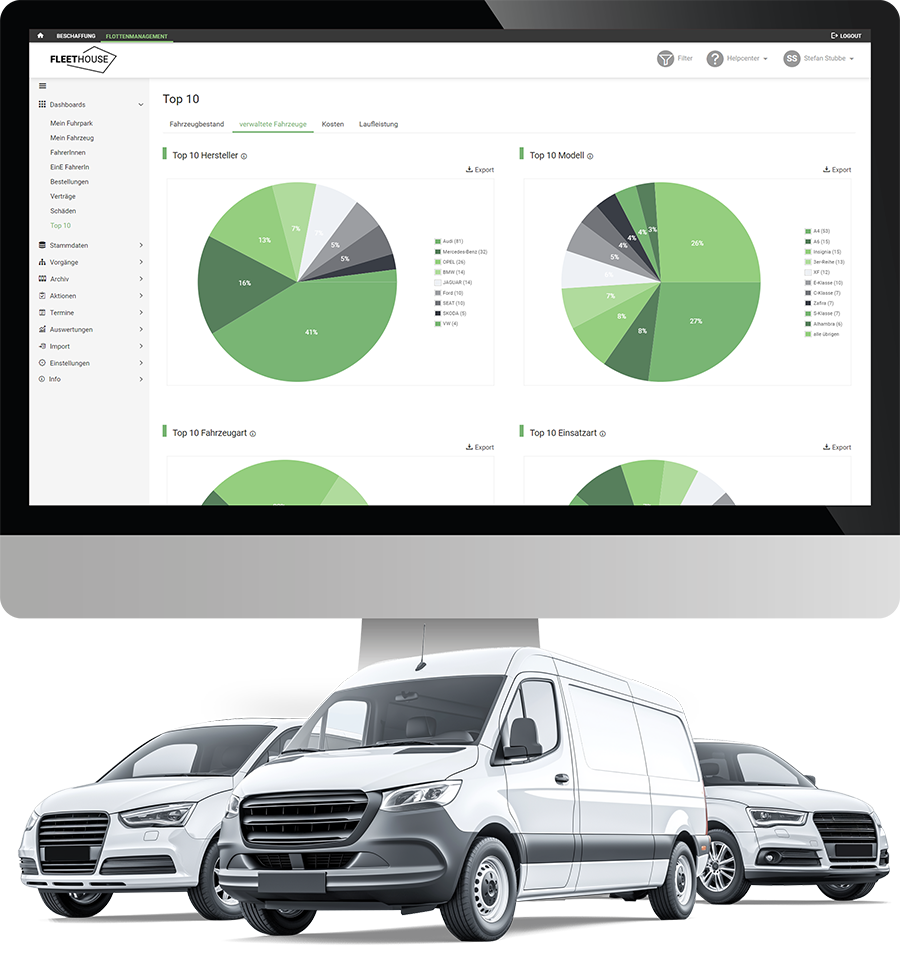TL;DR
Fleet management refers to the digital management and optimization of company fleets, including vehicle procurement, maintenance, cost control and compliance obligations.
The aim of fleet management is to reduce operating costs, increase efficiency and make mobility more sustainable (e.g. through e-mobility and pool vehicles).
Fleet management software such as Fleethouse automates processes, bundles vehicle data centrally and ensures legally compliant, transparent fleet management.
An efficiently managed vehicle fleet is a decisive success factor for many companies – regardless of whether it is just a few company cars or a large fleet of vehicles. Fleet management encompasses far more than just vehicle management. In our article, you will learn about the components of fleet management, what mobility alternatives there are in fleet management and how digitalization can support you in your tasks.
Contents
What does Fleet Management mean?
Fleet management refers to the holistic management and control of all of a company’s vehicles. This includes cars, vans, trucks or special vehicles that are used for operational purposes. While a dedicated fleet manager often takes on this task in larger companies, responsibility in smaller companies often lies with employees from administration or HR.
The areas of responsibility are varied and often extensive. From the selection and procurement of suitable vehicles, their deployment planning, maintenance and repair to the management of insurance, fuel costs and legal requirements – fleet management covers all aspects of company vehicles. The aim is always to operate the fleet efficiently, cost-effectively and safely .
What is part of Fleet Management?
Fleet management covers all organizational, technical and commercial tasks relating to the vehicle fleet. The most important components include
- Vehicle procurement and financing: selection of suitable models, negotiations with manufacturers or leasing companies and decisions on purchasing, leasing or renting. Fleet Management is also responsible for deciding on a car subscription.
- Vehicle management: recording of all relevant data such as mileage, contracts, maintenance intervals and insurance.
- Maintenance and servicing: planning of inspections, repairs and tire management to ensure the operational readiness and safety of the vehicles.
- Cost control: Monitoring of fuel consumption, workshop costs, insurance premiums and fines to optimize overall costs.
- Operator liability: Compliance with statutory regulations on operator liability obligations such as driving license checks, UVV inspections or UVV driver training or environmental requirements.
- Software and digitalization: use of modern fleet software for intelligent fleet management.
- Driver support: Organization of training courses, safety instructions and support with questions about vehicle use or guidelines.
All of these components work together and enable fleet managers to use their vehicles efficiently, safely and sustainably.

Digitize your fleet for just €2.90 per vehicle per month
Manage data centrally, keep an eye on all deadlines and monitor costs
Fleet Management digital: How fleet software can support you
In order to meet the growing demands of fleet management, digital solutions can provide a fundamental remedy. Where Excel lists or manual file folders were previously used, modern fleet software such as Fleethouse now offers a central platform to efficiently manage all relevant processes.
Fleet software helps fleet managers to record data reliably, meet deadlines and organize the fleet efficiently. Typical functions are
- Digital vehicle management: contracts, maintenance intervals, UVV inspections and driver’s license checks are documented and monitored.
- Cost management: The transparent presentation of fuel consumption, service costs and insurance enables a precise evaluation of the TCO and serves as an aid for targeted savings.
- Legal and compliance security: Digital reminders help to comply with legal requirements such as UVV inspections or driver’s license checks in good time. Drivers can also receive legally compliant training with digital UVV instruction as e-learning.
- Sustainability: software solutions offer evaluations of CO₂ emissions and support the switch to e-vehicles. Mobility alternatives, such as company bikes , can also be managed in modern software.
Fleet management for mobility alternatives
For a long time, traditional fleet management focused exclusively on the use of company-owned vehicles. However, rising costs, sustainability targets and changing employee needs mean that mobility alternatives are becoming increasingly important. Fleet managers today are faced with the task of managing not only vehicles, but also holistic mobility solutions.
The most important alternatives include:
- Car sharing and pool vehicles: Employees can use vehicles flexibly according to their needs. Corporate car sharing software can help to avoid idle times and thus save costs.
- Employee mobility budgets: Instead of a company car, employees receive a budget that they can use individually for public transport, e-scooters, car sharing or bicycles.
- Company bikes: Employees have the option of using a company bike for work and private purposes. This option is particularly popular in urban areas with high traffic volumes.
- Local public transport: integration of job tickets or cooperation with local transport companies.
- ElectromobilityDevelopment of charging infrastructure and introduction of e-vehicles as part of a sustainable mobility strategy.
Modern fleet management therefore means strategically combining different forms of mobility. Alternatives such as

The future of fleet management
Corporate mobility is changing: not only the integration of alternative mobility concepts, but also digitalization and sustainability are playing an increasingly important role in the design of mobility. Modern fleet software is already helping to automate processes and make data-based decisions. With increasing digitalization , the use of digital solutions for fleet management is becoming indispensable.
Another important topic is autonomous driving. In the future, self-driving vehicles could take over many tasks that have to be done manually today – from finding a parking space to visiting a garage on their own. As a result, the role of fleet management is shifting away from pure vehicle management towardsstrategic mobility and data management.
Sustainability is also becoming increasingly important: the switch to electromobility, the reduction of CO₂ emissions and the integration of alternative mobility options are becoming key fields of action. Fleet managers are faced with the task of combining ecological responsibility with economic efficiency and thus making a contribution to their company’s climate targets.
Future-oriented fleet management is becoming an increasingly complex task. Companies that adapt to these developments at an early stage not only secure competitive advantages, but also actively shape the operational mobility of tomorrow.
Arrange an online consultation appointment
Arrange your personal consultation appointment now. You can easily select a suitable appointment using our booking tool.

Anne Fuchs

Ciara Lazeta
The most important facts about fleet management
Structured fleet management ensures that companies can deploy their vehicles economically, safely and transparently.
The use of modern fleet software simplifies administration, reduces sources of error and supports compliance with legal requirements.
Sustainability, mobility alternatives and new technologies such as autonomous driving will shape corporate mobility in the long term.
FAQ - Frequently asked questions about fleet management
Fleet management refers to the holistic organization and management of the company fleet. This includes tasks such as vehicle procurement, maintenance, cost control and compliance with legal requirements. The aim is to operate the fleet efficiently, safely and economically.
The central tasks include vehicle procurement and financing, maintenance and servicing, insurance and contract management as well as cost control. Legal obligations such as driving license checks and UVV inspections are also an important component. This is supplemented by driver support and the strategic planning of future mobility solutions.
Modern fleet software offers a central platform for digitally mapping all processes. It automatically reminds you of deadlines, documents maintenance intervals, shows costs transparently and supports the planning of sustainable measures such as switching to electric vehicles. This saves companies time, reduces sources of error and increases efficiency.
Further Fleet Knowledge
If you liked this article and would like to know more about this topic, we recommend these articles.


Vehicle management: importance in the fleet and helpful tips

Car subscription: When is it usefull for your company?

E-car as a company car: taxes, costs and insurance
Further blog articles on the topic of fleet management
Fleet management: basics and helpful tips
Digital fleet management: Why even small fleets should digitize their fleets
Fleet Manager: Tasks, Qualifications and Salary
Fleet at a Glance: Importance, Trends and Technologies
Fleet management without Excel: How to save time and money
Measures for sustainable fleet management
Owner liability in the fleet: what fleet managers should bear in mind
Fleet insurance for your vehicle fleet: this is what matters
Fleet app – how to manage your fleet digitally and efficiently





